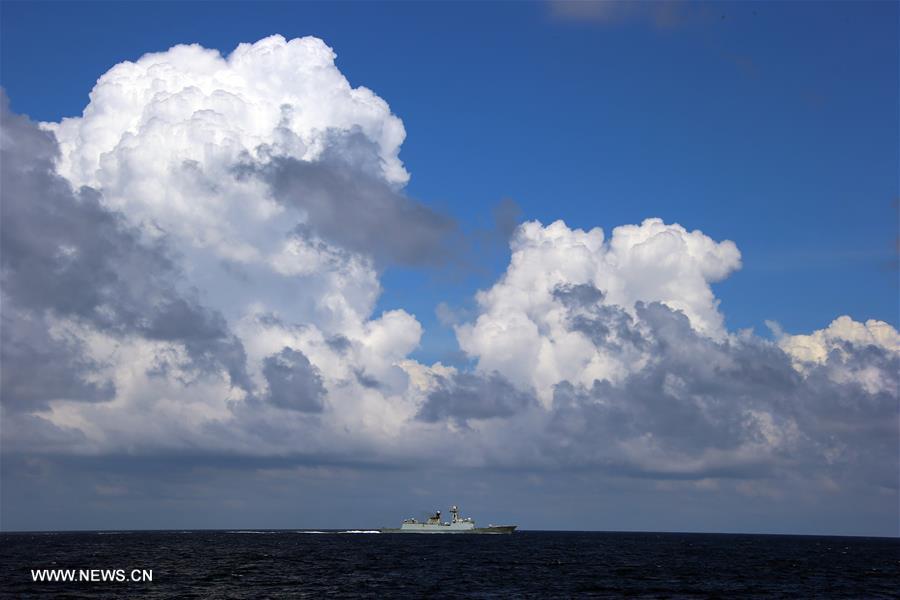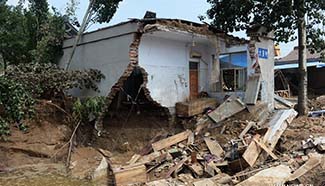SANYA, July 9, 2016 (Xinhua) -- A missile frigate of Chinese navy sails to the venue for the missile launch during a military exercise in the water area near south China's Hainan Island and Xisha islands, July 8, 2016. Chinese navy conducted an annual combat drill in the water area near south China's Hainan Island and Xisha islands on Friday. (Xinhua/Zha Chunming)
LONDON, July 24 (Xinhua) -- The South China Sea arbitration is in essence "a political farce under the cloak of law," Chinese Ambassador to Britain Liu Xiaoming wrote in an article published Sunday.
"Such a recklessly partial tribunal creates more problems than it solves, and intensifies rather than solves disputes," Liu wrote in a signed article published by the British newspaper The Sunday Telegraph.
In the article, the ambassador stressed that a legitimate arbitration needs to meet certain conditions, but the tribunal fails to do so.
"First, the tribunal shall have jurisdiction over the subject matter. Second, the arbitrators shall be impartial and authoritative. Third, the procedure must be reasonable. Fourth, the ruling on the substantive issues should help resolve disputes," he argued, noting that the South China Sea arbitration does not meet any of these conditions.
On jurisdiction, Liu said the subject matter of the arbitration initiated by the Philippines, and the real intention behind it, is in essence related to territorial sovereignty and maritime delimitation.
"Issues of territorial sovereignty are clearly beyond the scope of the UN Convention on the Law of the Sea (UNCLOS), and issues of maritime delimitation have been excluded by the declaration that China made years ago in accordance with UNCLOS," he elaborated.
"The arbitral tribunal in fact expanded its power into areas outside of its jurisdiction," added the diplomat.
The article pointed out that the tribunal is "an ad hoc body having nothing to do with the International Court of Justice" and its composition is "questionable."
"None of the five arbitrators is from Asia or has much knowledge of Asian history and culture. Most inconceivable in the arbitration process was that two arbitrators totally abandoned the opinions that they used to hold," the article said. "This only increases doubts about the impartiality, representativeness and the authoritativeness of the tribunal."
Liu also wrote that "the procedure of the arbitration went against normal practice" and that the dispute settlement system of the Convention requires that bilateral channels between state parties come before arbitration.
"However, disregarding prior bilateral agreements between China and the Philippines to resolve the disputes through negotiations and consultations, the tribunal forced ahead with the arbitration proceedings," he observed. "Such procedure is utterly unreasonable and it contravenes the general practice of international arbitration under the Convention."
Quoting an old saying "There's no free lunch", the ambassador said it "sums up the actions of the tribunal, paid with Philippine money."
"To cater to the Philippines' claim, the tribunal shrank the Taiping Island into a rock and was denounced by all Chinese on both sides of the Taiwan Strait," he emphasized in his article.
To save the Philippines from breaching its own commitment to bilateral negotiations, Liu said, the tribunal "belittled and nullified the Declaration on the Conduct of Parties in the South China Sea (DOC) reached between China and ASEAN countries."
The article also quoted the view of a former legal advisor at the British Foreign and Commonwealth Office, Chris Whomersley, who argued in a recently published law research paper that the tribunal is "potentially destabilizing" the overall stability of international relations.
"The impressive-looking arbitration is in essence a political farce under the cloak of law. Pretty words about protecting the law cannot gloss over the illegal essence and practice of the tribunal," Liu stressed.
Noting that the law has been "a victim of politics" throughout this farce, he further explained: "If such a farce were regarded as international law, and if international disputes were to be 'settled' in this way, the authority of international law and the peace between nations would be compromised."
"By not accepting or recognizing the ruling, China is not violating but upholding the authority and dignity of international law," he said.
In the article, the ambassador reiterated China's consistent position to resolve issues of territorial sovereignty and maritime delimitation through peaceful negotiations.
"We welcome the new Philippine government's recent statement about its willingness to re-open consultation and dialogue with China on the South China Sea issue," said Liu.
"We hope this positive gesture will be followed by real actions and that the Philippines will return to the track of negotiation at an early date, work with China to properly manage differences and jointly maintain the peace and stability of the South China Sea," he concluded.












